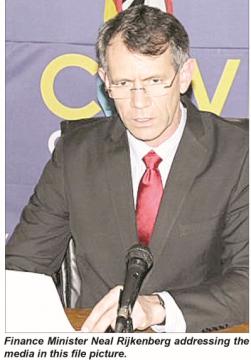COVID-19 HITS HARD ON BUDGET

LOBAMBA – The COVID-19 pandemic has wreaked havoc on the country’s 2020/21 financial year budget.
This was brought to light by the Minister of Finance, Neal Rijkenberg, when he presented his Mid-Year Budget Review Report in the House of Assembly yesterday.
Some of the areas that were hit hardest included the collection of company tax where government only managed to collect E460 million in the first half months which equals 26 per cent of the annual budget of E1.79 billion.
“This is a 43 per cent decrease in collections when compared to mid-year collections in the 2019/20 financial year,” said the minister.
Another area indicated by the minister to have reflected an under collection was on domestic revenue, where the minister stated that the half-year amounts reflected a collection of E4.47 billion.
He said this was below the E5.7 billion collected at the same time last year.
“This reduction has come despite an overall increase in taxes on goods and services,” said Rijkenberg.
Revenue
He highlighted that income tax, taxes on property and non-tax revenue collection, had decreased in this period.
The minister informed the MPs that income tax remained the largest contributor to domestic revenue collection. He stated that company tax, pay as you earn (PAYE), graded tax and other income tax collections, stood at E2.21 billion at half-year.
He said this equated to 36 per cent of the annual budget and was lower than the E2.73 billion collected at half-year of the 2019/20 government financial year.
“In truth all income taxes have been greatly affected by the lockdown resulting from COVID-19,” he said. Rijkenberg said the taxpayers’ inability to earn income had eroded the income tax base, but said they anticipated that the gradual opening of the economy would improve performance going forward.
The minister said individual taxes (PAYE), collected at half-year, amounted to E1.49 billion.
“This equals a 39 per cent collection of the annual budget of E3.87 billion and a decrease on the E1.69 billion collected at the same time last financial year. This is despite the three per cent cost-of-living adjustment (CoLA) and one per cent once-off payment to civil servants in August 2020,” submitted the minister.
Rijkenberg said taxes on goods and services constituted the second largest contributor to domestic revenue collection with value added tax (VAT) collection being the largest source within these taxes.
However at half-year, it was reported that this had totalled E1.42 billion, which was 41 per cent of the annual budget at E3.45 billion.
He said the collection of VAT showed a four per cent decline compared to last financial year, which could also be attributed to the partial lockdown which greatly eroded the tax base.
On another negative note, the minister revealed that the road toll revenue collected by mid-year amounted to E24 million, a 23 per cent collection on the annual target of E106 million.
Rijkenberg said the underperformance was due to the ban of non-essential international travel.
He stated that on the other hand, fuel tax at mid-year was 40 per cent of the target and this underperformance was caused by a decline in quantities of fuel demanded mainly as a result of imposed restrictions due to COVID-19.
The minister said a total of E122.13 million had been collected from non-tax revenue as at the half-year mark, which was significantly lower than the E422.9 million collected at half-year 2019/20.
Rijkenberg said economic activity slowed down in the first half of the year due to the COVID-19 pandemic.
He said the growth-retarding effect of the pandemic emanated from the containment measures that were quarantines, lockdowns and social distancing that government had implemented to curb the spread of the virus.
Effectiveness
He informed the MPs that the medium-term budget review statement sought to assess effectiveness of the resource allocations during the financial year and to reaffirm the medium-term policy stance grounded on fiscal sustainability. He said it echoed with the spirit of doing more with less and it further supported a package of mutually reinforcing economic recovery stimulus intervention to enhance direct investment and private sector participation. “Government has been running persistent fiscal deficits in the recent past. By committing to a fiscal consolidation process, the anticipation was to deviate from the trend and improve overall budget balance,” he said.
However, he stated that recent global and regional economic developments caused by the outbreak of the coronavirus had drastically deteriorated the prospect for domestic economic recovery, which was a situation not unique to Eswatini, but rather a global trend.
He said to prevent the economic crisis from deepening and further deterioration of government’s fiscal account, government had adopted a post-COVID-19 Economic Recovery Plan as well as a Fiscal Adjustment Plan.
He said these included both revenue enhancing and expenditure decreasing measures. He said the post-COVID-19 recovery plan was a short term high impact economic stimulus package that would resuscitate the economy by initiating a number of productive economic activities.
The minister said the Fiscal Adjustment Plan was fixed to span over three years with implementation starting in the 2021/22 financial year, adding that the scope for fiscal consolidation had been determined at 6.5 per cent of the gross domestic product (GDP).
He further mentioned that the Fiscal Adjustment Plan was also a precondition for the government to receive budget support under the Rapid Financing Instrument (RFI) from the International Monetary Fund (IMF).
Read more in tomorrow’s publication.




 del.icio.us
del.icio.us Digg
Digg
Comments (0 posted):